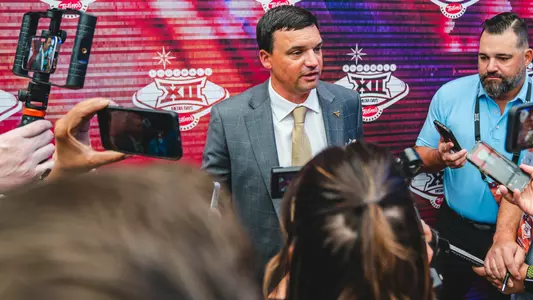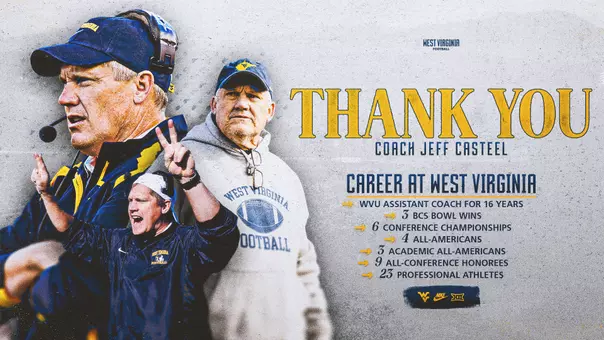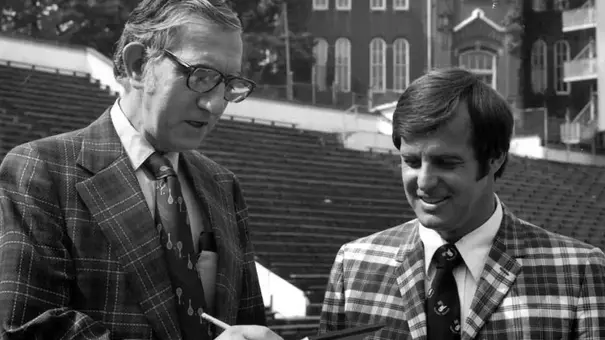
Photo by: WVU Athletic Communications
Schedules Matter – And Always Will!
July 15, 2024 02:24 PM | Football, Blog
MORGANTOWN, W.Va. – Every time I jump down into the rabbit hole of scheduling I always come back out of it with one big takeaway – schedules matter!
They do, and they always will.
I write this because West Virginia's 2024 docket is shaping up to being another humdinger of a football slate.
The Mountaineers open the season on Saturday, Aug. 31st, against Penn State, and anytime the Nittany Lions show up on the schedule, the highlighter comes out.
Then WVU plays Albany, which advanced to last year's FCS semifinals, before wrapping up its nonconference docket in Pittsburgh on Saturday, Sept. 14 with the semi-annual return of the Backyard Brawl.
Again, another highlighter game.
This will mark the fourth straight year West Virginia is playing 11 power conference opponents - the only school in the country to do so.
A year prior, West Virginia was the lone school to open the season on the road against a power conference foe for three straight years, and this fall, it will be just one of four power conference programs in the country to open with a power conference team for four straight years.
Asked last week in Las Vegas about this year's slate, West Virginia coach Neal Brown had this to say, "First of all, I didn't do that," he said.
He's right.
Football schedules are made far in advance, in some instances dating back as long as 10 to 15 years ago.
"I'm split on this," Brown continued. "As a head football coach, it puts us at a competitive disadvantage because everybody else isn't doing it. We play nine league games, and all the leagues don't play nine conference games.
"Then, we're playing two rival opponents the last several years," he pointed out. "In five out of the six years that we've been at West Virginia, we've played 11 power conference opponents, which puts us at a competitive disadvantage because everybody else is not doing it. But I do get it from a fan's perspective, too."
Had it not been for COVID, West Virginia's 2020 schedule would have included a season-opening date against Florida State in Atlanta and a home game against rival Maryland, both of which were canceled.
"We are the furthest team in the Big 12 in the (northeast) – we still are, even though we have a regional opponent now in Cincinnati, so, it's important from a fan perspective to be playing these regional rivalries and we've been able to do that," Brown noted. "We've played Maryland, we've played Virginia Tech, we've played Penn State and we've played Pitt.
"Now, what I think the best formula for us moving forward is to play seven home games every year, which every other year we've missed that opportunity," he noted. "You play a G-5, an FCS and then, one of those regional rivalries to go with your conference opponents."
So, how does college football expert Phil Steele view things?
He has West Virginia's 2024 schedule ranked the seventh-most difficult in the country, behind only Florida, UCLA, USC, Georgia Tech, Houston and Purdue.
Steele had last year's slate rated 14th heading into the season, although it ended up being 58th because of Pitt's down year and the new teams entering the league experiencing difficulties.
In 2022, Steele ranked West Virginia's schedule difficulty 21st and it ended up being 17th primarily due to TCU's run to the national championship game.
In 2021, he had it ranked 43rd and later modified it to 29th after the season, and in 2020, it was supposed to have been 26th with Florida State and Maryland on it.
In 2019, during Brown's first season at West Virginia, Steele ranked that schedule, which included nonconference opponents Missouri and NC State, 14th. He wound up improving it four spots to 10th at the end of the season.
With the possible exception of Dana Holgorsen, name another WVU coach who has lasted longer than five years here who has consistently played these types of football schedules? Art Lewis agreed to do it toward the end of his tenure in the late 1950s and wound up scouting for the Pittsburgh Steelers in 1960! Frank Cignetti survived four years here trying to do it in the late 1970s.
For comparison's sake, let's take a random look at TCU, one of West Virginia's peer Big 12 schools. The two teams do not meet this season.
Last year, the Horned Frogs' 2023 slate that included nonconference games against Colorado, Nicholls and rival SMU was rated 38th-most difficult entering the season by Steele. He later improved it to 14th.
TCU ended the year with a disappointing 5-7 record.
In 2022, when the Horned Frogs shocked the college football world by going 13-2 and advancing to the national championship game, they did so against a nonconference slate that included Colorado, Tarleton State and SMU, which ended up being Steele's 66th-most difficult schedule in the country that season.
If you want to dive deeper into Mountaineer football history and go back to some of the most successful years ever, you are going to find similar examples.
In 1988, for instance, West Virginia played just two teams during the regular season with winning overall records – 6-5 Pitt and 10-2 Syracuse. Penn State was 5-6 that year; Maryland was 5-6 and Cal State Fullerton was so bad that it eventually dropped its football program.
West Virginia ran the table and played Notre Dame for the national championship.
Jim Carlen's big year in 1969 featured wins against 4-6 Cincinnati, 3-7 Maryland, 3-7 Tulane, 0-10 VMI, 4-6 Pitt, 2-8 Kentucky, 3-7 William & Mary and 5-5 Syracuse.
In their only loss, the Mountaineers struggled to get the football past midfield against 11-0 Penn State, and later outlasted 6-4 Richmond by 12 points at Mountaineer Field on the way to its 10-1 record and Peach Bowl triumph over South Carolina.
Returning to the present, West Virginia's nine conference opponents this year feature Kansas, Oklahoma State, Iowa State, Kansas State, Arizona, Cincinnati, Baylor, UCF and Texas Tech, comprising teams two through six in the preseason media poll.
Teams 15 and 16 in this year's preseason poll are not on the schedule.
"You can't look at the preseason because who knows, right? We play a challenging schedule, and we don't ease into it at all obviously with Penn State," Brown said. "Then, we host Kansas week four and Lance (Leipold) has done a tremendous job there at Kansas. Jalon Daniels is electric, and he put on a show the last time they were in Morgantown. That's a game that I would love to forget. They've got Devin Neal and they've done a really good job schematically of spreading people out and getting people in one-on-one situations. Defensively, they played really good football toward the end (of last season).
"Then, we've got to go to Stillwater and this league, week in and week out, the great thing is you are going to have a chance to win, and the bad thing is everybody is good enough to beat you," he explained. "You've got to be able to navigate that and be able to win close football games. It's an extremely deep league. Our schedule is tough, but I think once everybody gets into conference games, it's always going to be tough."
Brown says offseason analysis has led him to the conclusion that his team has got to get out of the gate more effectively.
It struggled to do so in 2021 at Maryland, or to begin 2022 at Pitt, or last year at Penn State.
"Every year as a coach, you go back, and you evaluate: what can I do better? What do we need to do better?" he said. "We've played well at the end of the year, almost during our entire tenure, but how do we come out of the gate faster week one? That's something we've spent a bunch of time on.
"I think our guys were ready to play last year, but we just didn't execute at a high enough level to win the game at Penn State," Brown noted. "What we've got to do, and what we've spent a lot of time on, is (figuring out) how do we play better in that first game? We are not easing into it, so we're going to have a little bit more of a physical camp. We are going to put more emphasis on our early scrimmages and maybe go a little bit longer and do some more high-speed special teams work to get us ready for that game."
That's certainly one way to go about it.
The other is to dip your toes into the water instead of diving into the deepest part of the pool.
For years, Don Nehlen had great success with this formula, plus, he also had significant say in who they played. For instance, when he first took the job, he vetoed a long road trip out to San Jose State one year because it simply didn't make sense.
The school ended up canceling the game.
During the seasons when Nehlen's teams had extremely difficult openers, such as 1994 when WVU played Nebraska in East Rutherford, New Jersey, or in 1998, when it opened at home against Ohio State, Nehlen thought those teams could have had better records with more favorable scheduling.
"We opened with Nebraska (in 1994)," he recalled in 2006. "We needed some Dairy Queen to play in the opener, not Nebraska. Mike Logan gets a broken arm, and another kid blows out a knee in the tunnel before we even get out onto the field before the kickoff.
"I say to myself, 'boy we're off to a great start.' The highlight of the game was Todd Sauerbrun kicking a 90-yard punt. Then we find out at the end of the season that was as good a game as anyone gave them."
Nehlen continued.
"In 1998, we opened with Ohio State. Had we played anybody but Ohio State, we run the table," he predicted. "That's the best team I ever had (talent wise), but we played the very best team in America. We were a great football team and I thought we could win it all, but our team was never the same after that game. If we opened the year and won that game 35-0 … look out!"
Rich Rodriguez took a similar approach later in his WVU tenure after his team opened the 2003 campaign against Wisconsin. The 2004 opener at home against East Carolina was a laugher. In 2006, it was a 42-10 win over Marshall. The '07 opener was against Western Michigan …
You get the idea.
Therefore, as we climb out of this rabbit hole together, don't ever forget - schedules matter.
And they always will!
They do, and they always will.
I write this because West Virginia's 2024 docket is shaping up to being another humdinger of a football slate.
The Mountaineers open the season on Saturday, Aug. 31st, against Penn State, and anytime the Nittany Lions show up on the schedule, the highlighter comes out.
Then WVU plays Albany, which advanced to last year's FCS semifinals, before wrapping up its nonconference docket in Pittsburgh on Saturday, Sept. 14 with the semi-annual return of the Backyard Brawl.
Again, another highlighter game.
This will mark the fourth straight year West Virginia is playing 11 power conference opponents - the only school in the country to do so.
A year prior, West Virginia was the lone school to open the season on the road against a power conference foe for three straight years, and this fall, it will be just one of four power conference programs in the country to open with a power conference team for four straight years.
Asked last week in Las Vegas about this year's slate, West Virginia coach Neal Brown had this to say, "First of all, I didn't do that," he said.
He's right.
Football schedules are made far in advance, in some instances dating back as long as 10 to 15 years ago.
"I'm split on this," Brown continued. "As a head football coach, it puts us at a competitive disadvantage because everybody else isn't doing it. We play nine league games, and all the leagues don't play nine conference games.
"Then, we're playing two rival opponents the last several years," he pointed out. "In five out of the six years that we've been at West Virginia, we've played 11 power conference opponents, which puts us at a competitive disadvantage because everybody else is not doing it. But I do get it from a fan's perspective, too."
Had it not been for COVID, West Virginia's 2020 schedule would have included a season-opening date against Florida State in Atlanta and a home game against rival Maryland, both of which were canceled.
"We are the furthest team in the Big 12 in the (northeast) – we still are, even though we have a regional opponent now in Cincinnati, so, it's important from a fan perspective to be playing these regional rivalries and we've been able to do that," Brown noted. "We've played Maryland, we've played Virginia Tech, we've played Penn State and we've played Pitt.
"Now, what I think the best formula for us moving forward is to play seven home games every year, which every other year we've missed that opportunity," he noted. "You play a G-5, an FCS and then, one of those regional rivalries to go with your conference opponents."
So, how does college football expert Phil Steele view things?
He has West Virginia's 2024 schedule ranked the seventh-most difficult in the country, behind only Florida, UCLA, USC, Georgia Tech, Houston and Purdue.
Steele had last year's slate rated 14th heading into the season, although it ended up being 58th because of Pitt's down year and the new teams entering the league experiencing difficulties.
In 2022, Steele ranked West Virginia's schedule difficulty 21st and it ended up being 17th primarily due to TCU's run to the national championship game.
In 2021, he had it ranked 43rd and later modified it to 29th after the season, and in 2020, it was supposed to have been 26th with Florida State and Maryland on it.
In 2019, during Brown's first season at West Virginia, Steele ranked that schedule, which included nonconference opponents Missouri and NC State, 14th. He wound up improving it four spots to 10th at the end of the season.
With the possible exception of Dana Holgorsen, name another WVU coach who has lasted longer than five years here who has consistently played these types of football schedules? Art Lewis agreed to do it toward the end of his tenure in the late 1950s and wound up scouting for the Pittsburgh Steelers in 1960! Frank Cignetti survived four years here trying to do it in the late 1970s.
For comparison's sake, let's take a random look at TCU, one of West Virginia's peer Big 12 schools. The two teams do not meet this season.
Last year, the Horned Frogs' 2023 slate that included nonconference games against Colorado, Nicholls and rival SMU was rated 38th-most difficult entering the season by Steele. He later improved it to 14th.
TCU ended the year with a disappointing 5-7 record.
In 2022, when the Horned Frogs shocked the college football world by going 13-2 and advancing to the national championship game, they did so against a nonconference slate that included Colorado, Tarleton State and SMU, which ended up being Steele's 66th-most difficult schedule in the country that season.
If you want to dive deeper into Mountaineer football history and go back to some of the most successful years ever, you are going to find similar examples.
In 1988, for instance, West Virginia played just two teams during the regular season with winning overall records – 6-5 Pitt and 10-2 Syracuse. Penn State was 5-6 that year; Maryland was 5-6 and Cal State Fullerton was so bad that it eventually dropped its football program.
West Virginia ran the table and played Notre Dame for the national championship.
Jim Carlen's big year in 1969 featured wins against 4-6 Cincinnati, 3-7 Maryland, 3-7 Tulane, 0-10 VMI, 4-6 Pitt, 2-8 Kentucky, 3-7 William & Mary and 5-5 Syracuse.
In their only loss, the Mountaineers struggled to get the football past midfield against 11-0 Penn State, and later outlasted 6-4 Richmond by 12 points at Mountaineer Field on the way to its 10-1 record and Peach Bowl triumph over South Carolina.
Returning to the present, West Virginia's nine conference opponents this year feature Kansas, Oklahoma State, Iowa State, Kansas State, Arizona, Cincinnati, Baylor, UCF and Texas Tech, comprising teams two through six in the preseason media poll.
Teams 15 and 16 in this year's preseason poll are not on the schedule.
"You can't look at the preseason because who knows, right? We play a challenging schedule, and we don't ease into it at all obviously with Penn State," Brown said. "Then, we host Kansas week four and Lance (Leipold) has done a tremendous job there at Kansas. Jalon Daniels is electric, and he put on a show the last time they were in Morgantown. That's a game that I would love to forget. They've got Devin Neal and they've done a really good job schematically of spreading people out and getting people in one-on-one situations. Defensively, they played really good football toward the end (of last season).
"Then, we've got to go to Stillwater and this league, week in and week out, the great thing is you are going to have a chance to win, and the bad thing is everybody is good enough to beat you," he explained. "You've got to be able to navigate that and be able to win close football games. It's an extremely deep league. Our schedule is tough, but I think once everybody gets into conference games, it's always going to be tough."
Brown says offseason analysis has led him to the conclusion that his team has got to get out of the gate more effectively.
It struggled to do so in 2021 at Maryland, or to begin 2022 at Pitt, or last year at Penn State.
"Every year as a coach, you go back, and you evaluate: what can I do better? What do we need to do better?" he said. "We've played well at the end of the year, almost during our entire tenure, but how do we come out of the gate faster week one? That's something we've spent a bunch of time on.
"I think our guys were ready to play last year, but we just didn't execute at a high enough level to win the game at Penn State," Brown noted. "What we've got to do, and what we've spent a lot of time on, is (figuring out) how do we play better in that first game? We are not easing into it, so we're going to have a little bit more of a physical camp. We are going to put more emphasis on our early scrimmages and maybe go a little bit longer and do some more high-speed special teams work to get us ready for that game."
That's certainly one way to go about it.
The other is to dip your toes into the water instead of diving into the deepest part of the pool.
For years, Don Nehlen had great success with this formula, plus, he also had significant say in who they played. For instance, when he first took the job, he vetoed a long road trip out to San Jose State one year because it simply didn't make sense.
The school ended up canceling the game.
During the seasons when Nehlen's teams had extremely difficult openers, such as 1994 when WVU played Nebraska in East Rutherford, New Jersey, or in 1998, when it opened at home against Ohio State, Nehlen thought those teams could have had better records with more favorable scheduling.
"We opened with Nebraska (in 1994)," he recalled in 2006. "We needed some Dairy Queen to play in the opener, not Nebraska. Mike Logan gets a broken arm, and another kid blows out a knee in the tunnel before we even get out onto the field before the kickoff.
"I say to myself, 'boy we're off to a great start.' The highlight of the game was Todd Sauerbrun kicking a 90-yard punt. Then we find out at the end of the season that was as good a game as anyone gave them."
Nehlen continued.
"In 1998, we opened with Ohio State. Had we played anybody but Ohio State, we run the table," he predicted. "That's the best team I ever had (talent wise), but we played the very best team in America. We were a great football team and I thought we could win it all, but our team was never the same after that game. If we opened the year and won that game 35-0 … look out!"
Rich Rodriguez took a similar approach later in his WVU tenure after his team opened the 2003 campaign against Wisconsin. The 2004 opener at home against East Carolina was a laugher. In 2006, it was a 42-10 win over Marshall. The '07 opener was against Western Michigan …
You get the idea.
Therefore, as we climb out of this rabbit hole together, don't ever forget - schedules matter.
And they always will!
Ross Hodge | BYU Preview
Friday, February 27
Treysen Eaglestaff | BYU Preview
Friday, February 27
Women's Basketball Playbook | Cincinnati
Friday, February 27
Meme Wheeler | Feb. 27
Friday, February 27















